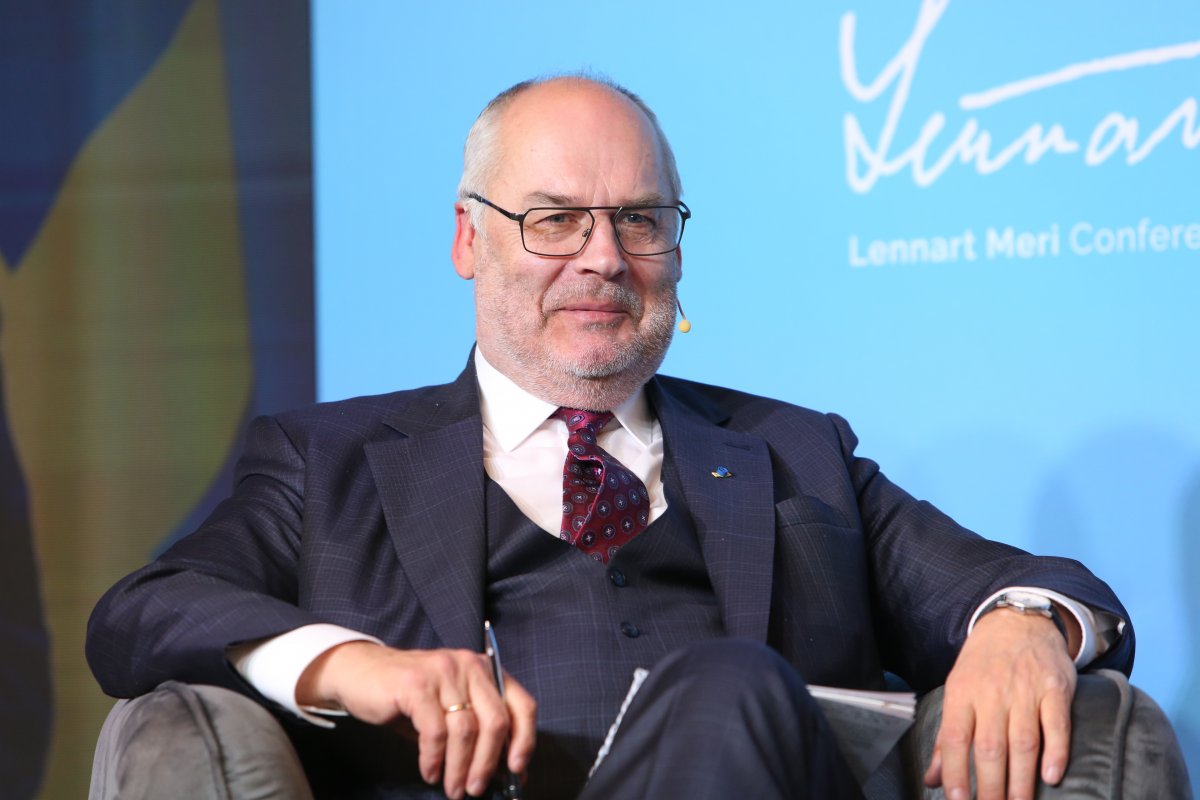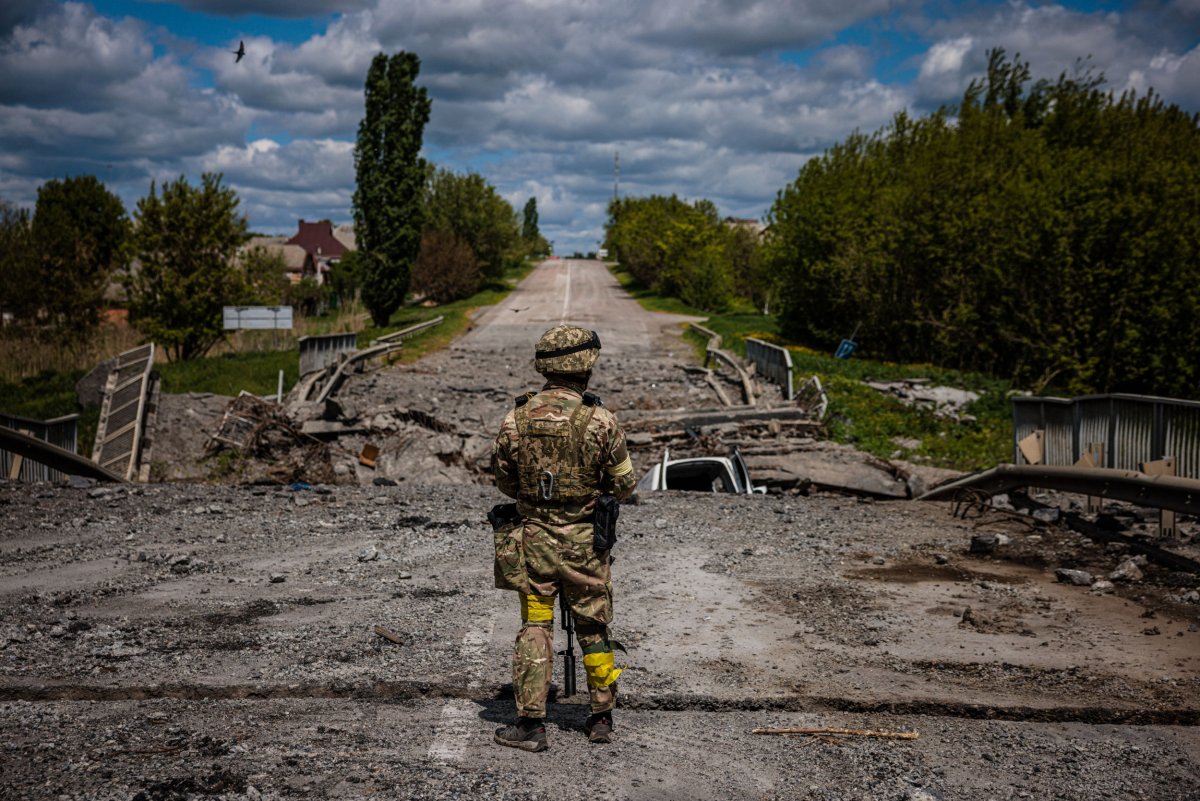Estonian President Alar Karis has urged fellow NATO nations to prepare for a possible rapid and momentous change in Russia's political landscape, as Russian President Vladimir Putin's war on Ukraine falters.
Any hint of Putin's demise, the president warned, could create a dangerous power vacuum in Russia and imperil the world's largest nuclear arsenal.
Karis also warned NATO that the Russian threat will outlast the end of the Ukraine war, necessitating a "permanent" alliance response in eastern and northern Europe. However, the president said it is not feasible for the West to completely isolate Russia and that—even if it takes decades—it remains important to work with Moscow.

Speaking with Newsweek on the sidelines of the Lennart Meri Conference in Tallinn, Estonia, on Sunday, Karis said all EU and NATO states must understand there can be no return to "business as usual" with Russia, regardless of the outcome of President Vladimir Putin's latest invasion of Ukraine.
"It's not only a war in Ukraine, it's our war as well. And we have to stop it over there," Karis told Newsweek. "The most important lesson, probably, is that we can't continue after the war like we continued after the Crimea annexation, like it's going to be business as usual."
But, Karis said, some business will have to continue. EU, NATO, and partner nations are imposing ever-more stringent sanctions on Russia in response to its invasion of Ukraine. Moscow is more economically isolated than ever, though it can still count key trading partners outside of the West including China and India.
"Of course, we can't make Russia isolated completely," Karis said. "We have to find ways to communicate with Russia in different ways, and to do some business with Russia. But it takes time, and it might even take decades."
Finland has traditionally been a diplomatic bridge between Russia and its Western adversaries. But Helsinki—along with neighboring Sweden—has jettisoned its decades-long policy of neutrality and announced its intention to join NATO, to Russia's chagrin.
NATO growth appears imminent, despite Turkish President Recep Tayyip Erdogan's threats to torpedo the Finnish and Swedish applications. If successful, this expansion might burn one of the few remaining bridges between the West and the Kremlin.
"It depends on Russia," Karis said when asked if Finland's NATO accession would shut off the East-West diplomatic conduit running through Helsinki.
"They do have certain experience of dealing with Russian politicians. In a way they have been successful, but on the other hand you see they're joining NATO now. So I think the time is over for Finnish politicians to have this kind of bridge, like it used to be before."
Estonia and its Baltic neighbors have enthusiastically supported Finland and Sweden joining NATO. Their accession as the 31st and 32nd NATO states will transform the strategic picture in northern Europe.
The Baltic Sea will become what some are referring to as a "NATO Lake," and alliance eyes will be able to watch all Russian aircraft and vessels operating from the Kaliningrad enclave and the vital port of St. Petersburg.
"Of course military-wise, it makes a huge difference," Karis said of Finland and Sweden joining the alliance. "It's all NATO countries around the Baltic Sea."
But the significance goes beyond the military realm, Karis said: "It does make changes here. And maybe we can get rid of this 'eastern European' kind of concept. It's not geographical, it's political. We belong to a bigger Baltic Sea region. And this makes a difference."
On Friday, Karis lauded Estonia's contribution to Ukraine—the country has given aid equivalent to one-third of its annual defense budget—and invited "all my NATO and EU friends to try to surpass us."
"It's always realistic to ask," Karis said when asked if this was a realistic request.
"We have been together in this big family at some point. And we know what it means to be occupied. And we also know from our parents and grandparents what war actually means.
"Quite a number of Estonians—volunteers as well as politicians—have been to Ukraine, and have seen all these horrors and crimes against humanity...In a way I was also surprised that Estonian people were so helpful. It doesn't happen every day."
The Baltic states and their eastern European counterparts have been at the forefront of the Western response to Russia's invasion. Estonia's first delivery of Javelin anti-tank missiles arrived in Kyiv a week before the Russian assault, and Foreign Minister Eva-Maria Liimets was—along with her Latvian counterpart—in the capital when Russian bombs started falling on February 24.
Their Russia warnings long overlooked by their larger Western allies, officials in the Baltic states now feel they have become the moral heart of the EU and NATO. At this weekend's LMC meeting in Tallinn, several speakers suggested it was time for top alliance roles to be filled by easterners. "Of course it's time," Karis said.
"The EU and NATO don't only have positions for big countries. So it's about time, yes absolutely. Of course, it would be nice to have the Secretary General of NATO let's say, from Estonia. It would be extremely nice. There are a number of candidates already."
To the west, larger and richer countries are expanding their support for Kyiv, though appeals for dialogue and an immediate ceasefire in Paris and Berlin are causing consternation in Ukraine and among fellow NATO and EU states.
"These bigger countries are starting, already, to put more money and more help into Ukraine," Karis said. "So it probably takes more time for these countries, compared to smaller ones like Estonia and Latvia."
"I would say I am frustrated, but I understand what 'big' means," the president continued.
"Germany has so many ties from 1975, when it signed an agreement with the Soviet Union to get this cheap oil from Russia. And they don't have any alternatives left these days, either wind parks, or nuclear plants, or oil, or coal. So this is where Germany is at the moment."
The pace of change of slow, but the shift is evident. "I understand that this turn of 180 degrees has happened," Karis said of the German posture.
"It might be that sometimes you get mixed signals from Germany.
"Countries and politicians, we do develop. And the same happens with Germany and other big countries who have different ties with Russia."
The Baltic states are urging Germany, France, and other top EU powers to demonstrate their commitment to the Ukrainian cause by approving Kyiv's EU candidate status.
The European Commission is expected to publish its analysis in June, after which Ukrainian leaders hope member states will approve what would be a major step on Kyiv's likely long road to accession.
"It's a long way to go," Karis said of Ukraine's EU ambition. "That's why I don't believe in this 'fast track'— it doesn't exist. But we have to show the green light to Ukrainians, to open the door so they can make all the changes needed and fulfill all the criteria needed to join the EU. And we have to encourage them to do so."
Many of the Russian units that had been deployed along Baltic frontiers are now fighting in Ukraine, struggling to advance Moscow's Donbas offensive against fierce Ukrainian defenders increasingly well-armed with Western weapons.
But this force depletion won't last, and the Russians will learn from their mistakes, Karis warned: "We have to take it seriously. The challenge of Russia will remain. Even after the Ukraine war is over, it will stay. You have to have troops here, and permanent troops."
Estonian and fellow Baltic officials and commanders are among those pushing for NATO to abandon its "enhanced Forward Presence" concept at the coming Madrid summit in June.
The eFP approach is based on small "tripwire" combined units in the Baltic states, which in the event of a Russian invasion would be expected to be overrun before a full NATO response is possible.
"It is important to have troops everywhere to defend," Karis said. "I don't like the idea of something like an 'eastern flank,' and 'central European flank,' and maybe a 'Nordic flank.' It's all NATO, and it has to be the same everywhere. Of course, on this border with Russia, you probably have to have more troops than in, I don't know, Belgium."

"It's one thing that they were ill-prepared," Karis said of the Russians fighting in Ukraine. "It doesn't mean their military power is gone. There might be a new regime which is much much more prepared to start wars. We don't know. The military power is there. I wouldn't underestimate Russia as such."
Meanwhile, the president said, the Western alliance must be prepared to deal with sudden seismic political changes within Russia. "This happened before, it happened 30 years ago as well," he said.
"We have to be prepared. Things might happen all of a sudden. Even internally, something might happen, or externally. We have to be ready. We don't want to have this kind of vacuum over there. They've got nuclear power and everything."
The political situation in Russia is difficult to interpret from the West. There appears little organized resistance to Putin, and no obvious candidate to take over from the aging dictator.
The war prompted significant public demonstrations in February and March, but state repression makes it difficult to gauge the extent of anti-government sentiment.
"We don't know what people actually think, if they like Putin or if they are pro-war in Ukraine," Karis said.
"We have been in a similar situation in Soviet times. Sometimes if you change your leader it doesn't mean that much change in a political arena...It's difficult to say what's going to happen in Russia. But as I said, we have to be prepared for everything."
Newsweek has contacted the Russian Foreign Ministry to request comment.
Uncommon Knowledge
Newsweek is committed to challenging conventional wisdom and finding connections in the search for common ground.
Newsweek is committed to challenging conventional wisdom and finding connections in the search for common ground.
About the writer
David Brennan is Newsweek's Diplomatic Correspondent covering world politics and conflicts from London with a focus on NATO, the European ... Read more
To read how Newsweek uses AI as a newsroom tool, Click here.








